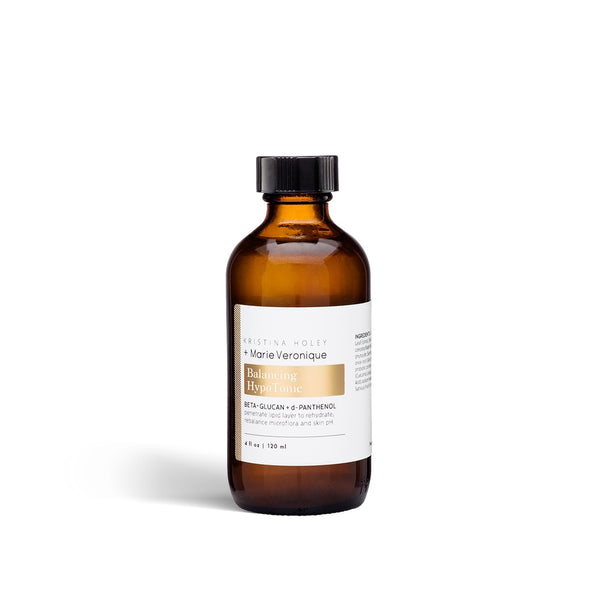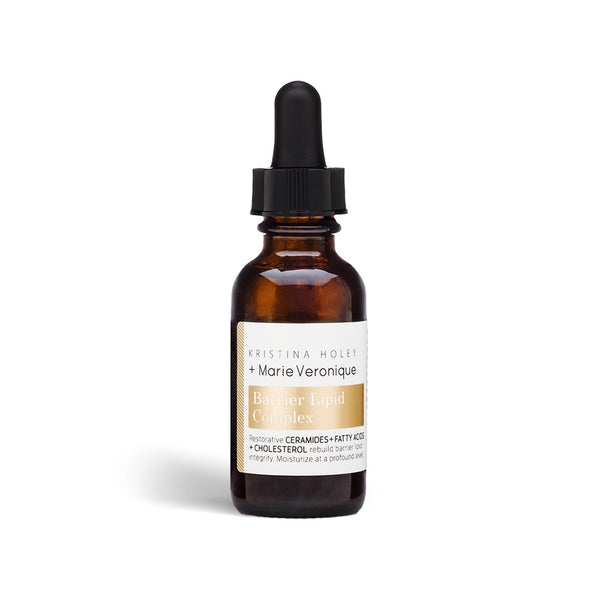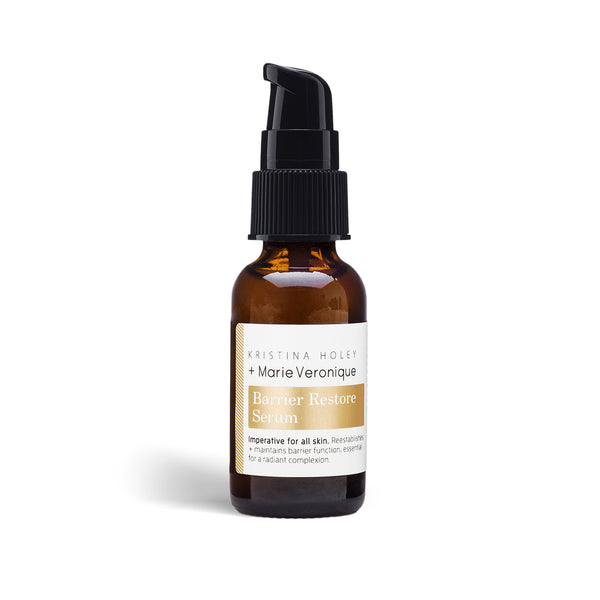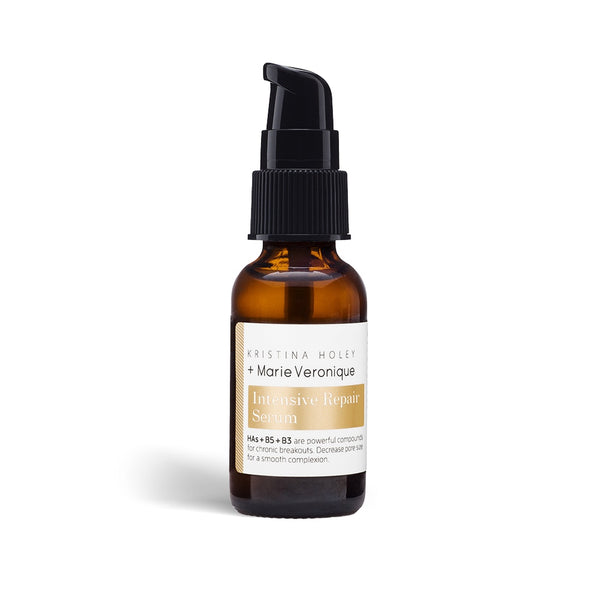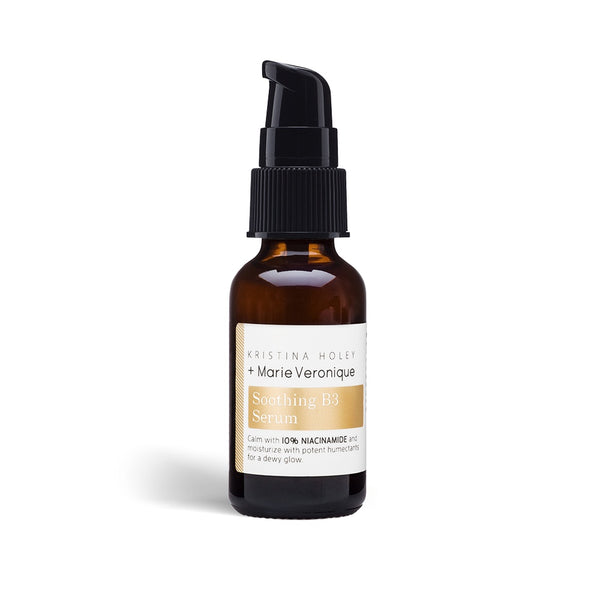Acne often reads like rosacea and rosacea often reads like acne. Is there a distinction between the two?
Hmmm, I am not sure I agree with that statement. Although some characteristics of rosacea for those with subtype 2 (papulopustular) can have similarities such as bumps or small pimples, the dysfunction stems from different places. Rosacea comes with its fair share of microbial imbalance disrupting the harmony of the microbiome but with acne, it means there are bacteria present such as p.acnes involved causing infections and inflammation often from viscous excess oil which can block a follicle; thus bacteria building up and causing an infection. Rosacea does have to do with inflammation and often pathogens, but not necessarily the same types. In my opinion, the word "acne" is totally overused. Let's use the word breakout instead, as it can mean any sudden appearance of an unwanted bump or rash or in the case of over oil production causing inflammation and bacteria leading to an infection. The initial source is difficult to determine but varies from case to case.
What is rosacea and why does it occur?
Rosacea is an inflammatory and immune response related condition of the skin that can be caused by various triggers. These triggers are often a combination of lifestyle and environmental factors that provoke inflammatory signals to the skin tissues and dilate the capillaries causing redness.
Both the innate and adaptive immune system are involved in the development of rosacea at a very early stage. It seems that a compromised immune system triggers an inflammatory response inappropriately which can create patterns in the body and present more chronic symptoms over time.
In efforts to resolve rosacea it is essential to pay attention to what your triggers are and when your symptoms are heightened. Internal factors include, diet, organ function, histamine levels, internal heat, emotional stress, etc. While external factors include improper use of harsh topicals and contact sensitization, allergies, pollution, excessive UV exposure, etc.
Rosacea can occur for many different reasons and it is often difficult to figure out what started it. One major trigger to pay attention to is UV exposure. UV's can increase vascularization of the skin and cause swelling and a release of cathelicidin. Cathelicidin is an antimicrobial peptide that, when processed by rosacea-type skin results in vasoactive and pro-inflammatory peptides and peptide fragments. The skin produces leukotrienes and cytokines and initiates arachidonic acid cascades, all in response to something completely normal. Meaning, your skin and body are responding in ways in which it was made to do in order to heal for times when you cut yourself (for example) but with rosacea, there is no reason for the response.
How do you treat it? Is it fully reversible?
In some cases, yes. In others, you can limit exposure to triggers like environmental factors and keep the manifestation of symptoms very regulated. Oftentimes a common trigger is the nervous system, which is a little harder to regulate.Treating rosacea involves:
How large of a role does food play in this skin condition?
I believe that food is rarely the "cause" of our skin symptoms. Food provides nutrition and micronutrients to the body that we require to live and carry out functions. Food can influence the internal ecosystem of our body; the acid balance, pathogenic balance, digestional state and function, hormonal balance and the state of all the organs of elimination. When the body is overworked with hard to digest foods, or mitigating allergies from certain foods, processing high histamine loads, or constantly trying to alter the acid balance then it can become symptomatic. I always say to my clients that if their skin is showing signs of stress via breakouts, redness, dryness, etc then to eat like you are sick. Decrease the overall load of the body, optimize pathways of elimination, and make sure you are getting in essential nutrients and the body tends to recover and heal on its own. I think that taking breaks from foods to reset the system can be incredibly effective at healing and desensitizing, especially in regards to the skin. However, I find that my clients with the least dietary restrictions (unless a true allergy) are hands down the ones with the healthiest skin.
What supplements can you add to your diet to help?
This depends person to person, on your current state and symptoms present. Ideally, you don't need any supplements and can get everything via your diet, but for example, if you are trying to decrease rosacea flare-ups then focusing on the following suggestions can help:
An important dietary focus would be to get enough Vitamin C and bioflavinoids to help increase your immune system. Some examples are: citrus fruits, cherries, spinach, green peppers, broccoli and red and yellow onions and green tea.
Immune response and support:
The traditional method of dealing with acne has been a more aggressive approach, what are your thoughts on this? Do you believe in attacking or nourishing it?
Lots of thoughts on this. Of course, I believe in nourishing the skin and never attacking it. The old method of stripping the oil and killing the bacteria is pretty ineffective and often leads to other conditions down the road such as dermatitis and rosacea. You have to think of the skin as a delicate balance of many different layers that create healthy skin. A daily diet of topical antibiotics and antimicrobials prescribed to combat acne may work for a time, but ultimately, they can disrupt the skin’s microbiome balance.
The more we can support a healthy microbiome topically, support a healthy "quality" of sebum produced via diet, digestion, circulation, etc. and reduce inflammation via internal support and proper topicals, the less risk there will be of acne.
I take acne very seriously as being a clear sign from the internal body that something is not quite right. This is likely how it begins, and then with the use of topicals and antibiotics, it can become more of a superficial/topical issue which can become difficult to resolve. Skin microbial dysbiosis takes patience to heal and often results in symptoms such as rosacea, acne, eczema, psoriasis and other rashes.
Rather than stripping the skin of its oils, you can support a healthy lipid layer with strategic ratios of Omega-3 and Omega-6 which both facilitate deep penetration to dissolve and prevent congestion.
You can also avoid congestion by supplementing with zinc and pantothenic acid (Vitamin B5), by using gentle formulations containing AHA/BHA to help unclog pores and by using a topical retinol/retinoid product nightly.
Is acne genetic? Are certain people more prone to acne than others?
Yes, it depends on the microbiome you inherited, your constitution you inherited, how you were raised, your nervous system, lifestyle, etc. You may be more predisposed than others but that does not mean you are cursed with acne forever. You can always move forward and heal, I believe.
When dealing with an acne breakout what is your go-to?
I like the Marie Veronique Treatment Serum for treating skin that breaks out often. If you do this for a few months you can rebalance the skin and avoid breakouts altogether. As a spot treatment, I really like Marie Veronique Intensive Repair Serum. This is really quick to bring down inflammation and decongest the pore. You can use them together as well.
We all know by now not to pick acne, are there any other tips you can give for speeding up healing?
Yes, picking pretty much always leads to making it worse. We are dealing with bacteria here and don't want to create more trauma and inflammation or spread the infection. My suggestion is to let it be and treat it with gentle and strategic ingredients which are known to target pathogens such as p. acnes, staph or strep- tea tree oil or acetic acid are good ones for that. Then hit it with anti-inflammatories such as niacinamide or EGCG, and try to decongest the pore with salicylic acid or sodium salicylate and b5 panthotenic acid.
What are your favorite products for acne and rosacea?
ROSACEA:
ACNE:
For teenage acne and those with very oily skin:
The entire Treatment Line as a system.
FOR ADULT ACNE:

